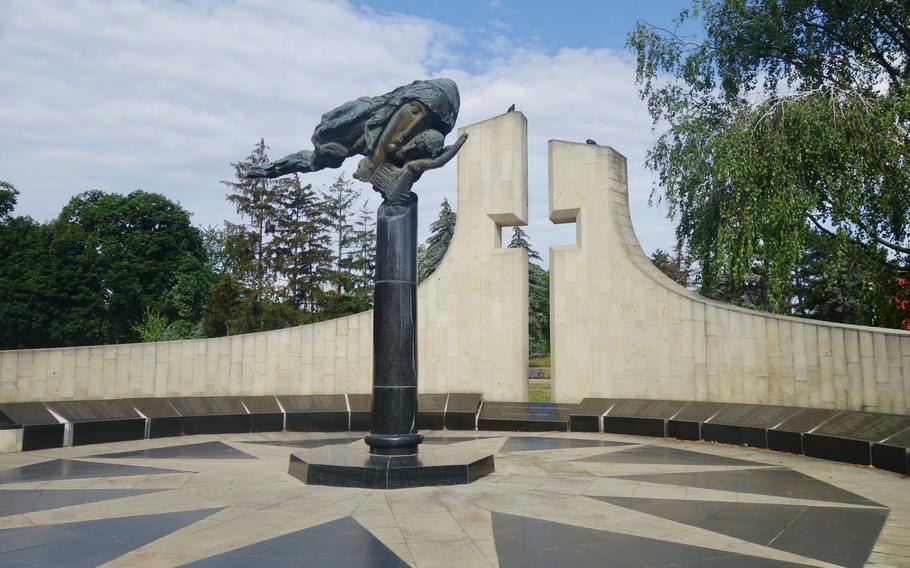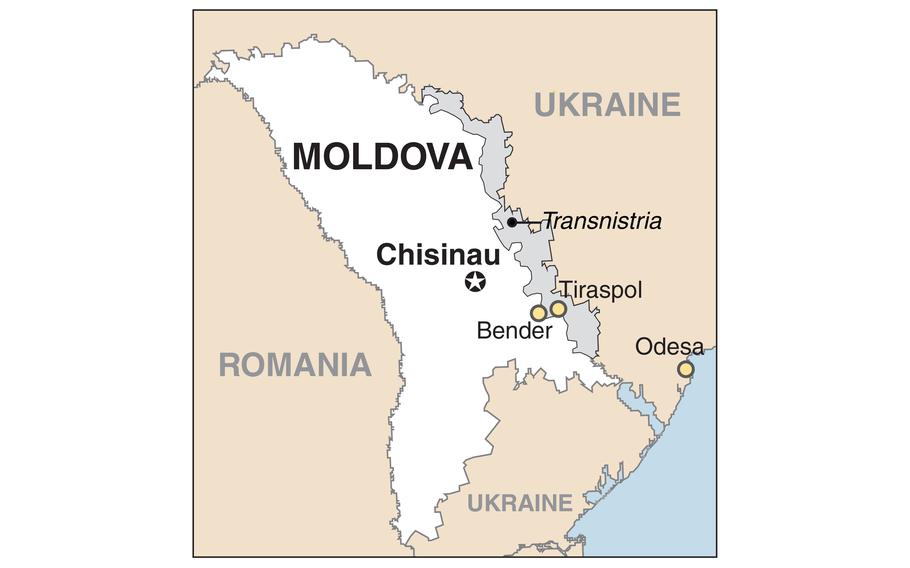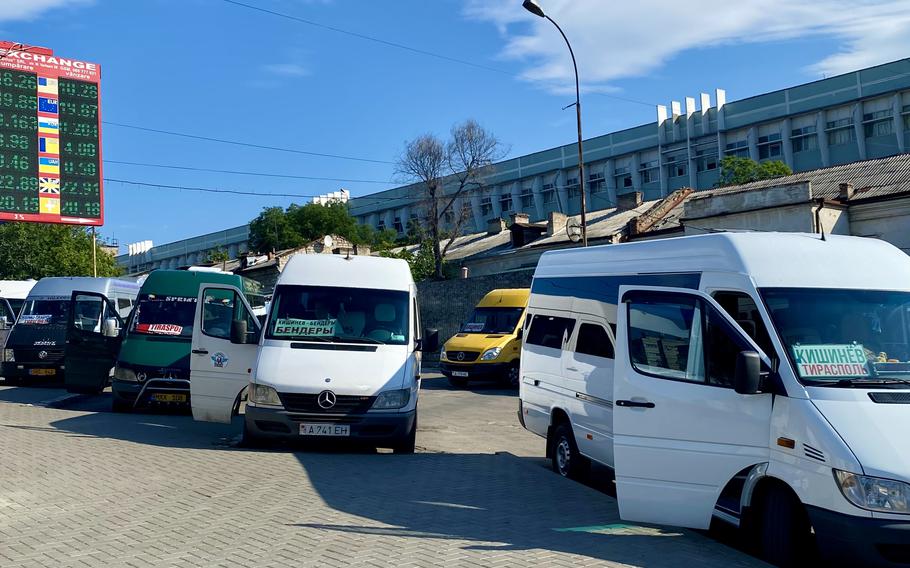
A memorial in Chișinău, Moldova, to the victims of the Transnistria War, which was fought in the early 1990s between pro-Russian separatists and the Moldovan government. (Svetlana Shkolnikova/Stars and Stripes)
CHIȘINĂU, Moldova — The breakaway Russian-speaking territory of Transnistria on Ukraine’s western border is part of Moldova but refuses to join it. It’s occupied by Russian troops but not recognized by Moscow. Residents like Aurel want to keep it that way.
The 68-year-old, who declined to provide his last name, is a 50-year resident of Bender, a border town in Transnistria. He said he has no qualms with the state of limbo established by a pro-Russian uprising in 1992 and had no desire for Transnistria, a 250-mile stretch of land still steeped in imagery from its Soviet past, to integrate with Moldova or officially become one with Russia.
“Our town is clean, green and there’s flowers and roses everywhere,” Aurel said on a recent bus ride from Bender to Chișinău, Moldova’s capital. “It’s quiet, calm and everything is like it always was.”
But the war raging in Ukraine and its outcome will likely upend the status quo Transnistria’s some 300,000 residents have grown accustomed to, potentially providing an opportunity to resolve a frozen conflict that has stalled at the negotiation table for decades, officials and analysts say.
“This is the right time to start preparing and for both sides to start thinking about what they want from a settlement,” said a senior international official, speaking on condition of anonymity under rules of their organization. “The conflict has created conditions in which both sides should start preparations for a future settlement.”
For the first time in 30 years, the power dynamics between Chișinău and Tiraspol, Transnistria’s capital, have flipped, the official said. Tiraspol, once having the upper hand due to its support from Russia, has been forced into a more submissive position since Ukraine shut its border with the rebel state last year.
The closures cut off Transnistria from its main trading partner, blocked access to a vital seaport in the Ukrainian city of Odesa and forced all Transnistrian imports, exports and people to solely pass through Moldovan border crossings.
“They’re kind of stuck and it’s a good thing for negotiations,” said U.S. Ambassador to Moldova Kent Logsdon. “I think people are looking to the end of the war in Ukraine and when that happens, is that a time that maybe a peaceful political settlement can make progress?”
Efforts to bring lasting peace to the region began shortly after a bloody war between Russia-backed secessionists and the Moldovan government claimed nearly 1,000 lives and ended in ceasefire. The Organization for Security and Cooperation in Europe (OSCE), a regional security organization, is tasked with facilitating a settlement between the two sides, with the United States and European Union acting as observers at high-level talks.

(Noga Ami-rav/Stars and Stripes)
The talks are unlikely to resume while Russia wages war in Ukraine because both countries are mediators in the negotiations. Lower-level discussions continue, however, despite icy tension between Ukrainian representatives and their Russian counterparts, according to the senior international official.
Moscow maintains a foothold in Transnistria through a 1,500 “peacekeeping” military force, though most troops are local recruits with Russian passports. The soldiers are ill-equipped, poorly trained and have “zero capability” of combat operations, said Alexandru Flenchea, a former Moldovan deputy prime minister for reintegration and now director of the Initiative 4 Peace think tank.
Russia’s invasion of Ukraine last year, and a series of explosions reported in Transnistria a few months later, raised the specter of Russia pushing its southern offensive into Transnistria. Those fears largely passed as the Kremlin’s forces struggled to make gains in Ukraine though the head of Moldova’s spy agency warned in December that Russia will try again this year, with a possible aim of seizing a Soviet-era ammunition depot in Transnistria.
The stockpile of 20,000 tons of arms and munitions is one of Eastern Europe’s largest and the possibility that an errant missile will detonate it remains a constant worry, said the senior international official. There is much less concern that Russia will draw Transnistria into the war or recognize the region as an independent republic, as it did with occupied territory in Ukraine, said Flenchea.
“As much as [Russian President Vladimir] Putin wants to restore the Soviet Union in one shape or form, Moldova does not have that symbolic value for Russia as Ukraine does,” he said. “Transnistria alone is of no value for Russia, the only value it has is that of a leverage that Russia can use to put political pressure on Moldova.”
Moldova last year received coveted status as a candidate for membership in the European Union, alongside Ukraine, and intends to join the union by the end of the decade. The existence of Transnistria in its current form complicates those aspirations.
“How can one imagine Moldova being part of the EU with Russian troops on its soil?” Flenchea said.
The blue European flag is ubiquitous in Moldova and one even graces a welcome sign to the commune Calfa, located just outside a Transnistrian border checkpoint. Moldova’s pivot away from Moscow’s orbit has soured Russia’s attitude, said Kate Fearon, a deputy director in the OSCE’s Conflict Prevention Center in Vienna, Austria.
In February, Russian Foreign Minister Sergey Lavrov accused the West of looking to turn Moldova into “another Ukraine.” Russia last year cut energy supply to Moldova as punishment, triggering sharp inflation and mass discontent. Moldova has since found alternative sources of natural gas but is still reliant on electricity from a power plant in Transnistria.
Transnistrian authorities have at times echoed Russian claims of attempted Ukrainian provocations on their territory and often announce snap military training exercises but are otherwise loath to bring the war home, according to the senior international official. Chișinău too has swatted away Ukrainian offers to help Moldova reclaim the breakaway state militarily, preferring a peaceful reconciliation.
“There have not been military movements that have caused alarm,” the official said.

Rows of minibuses in Chișinău, Moldova, readying to carry passengers to and from Transnistria. (Svetlana Shkolnikova/Stars and Stripes)
Links between Transnistrian and Moldovan residents have frayed over the decades but remain strong. Minibuses travel frequently between Chișinău and Tiraspol, with most people heading to Moldova’s capital, said a bus driver who declined to be named. Many Transnistrians come to work, shop and see family and friends in Chișinău.
The number of passengers has dropped in recent years as the region, like the rest of Moldova, continues to lose residents to wealthier European nations, the driver said.
“Only old people that are poor are left,” he said. “They get their pensions from Russia so that’s why they want to be with Russia. They pray that nothing happens, that everything is good for them. Their gas is cheap, their salaries are low but they live calmly.”
Polling in Transnistria, though conducted in a repressive political environment, indicates a lot of sympathy and loyalty to Russia as well as sympathy for Ukraine, said Flenchea, the former Moldovan deputy prime minister for reintegration. When asked if they can one day envision Transnistria being a part of Moldova, many Transnistrian residents answer “yes.”
“Russia is far away and Ukraine is right there, behind the fence, and Moldova is also right there,” Flenchea said.
He believes the best time to make headway in negotiations was in the first three to six months of the war, when Transnistria’s leadership felt “particularly vulnerable and exposed.” That opportunity was missed due to Moldova’s preoccupation with the aftershocks of Russia’s invasion but a final settlement is still possible, he said.
Moldova must triple its work with partners in the United States and Europe to a lay out a vision for the country’s future and put together all the pieces necessary for reintegration, Flenchea said.
“There will be no restoration of the status quo in Transnistria even if there’s a deep freeze in the Ukraine war,” he said. “It will be a different reality.”